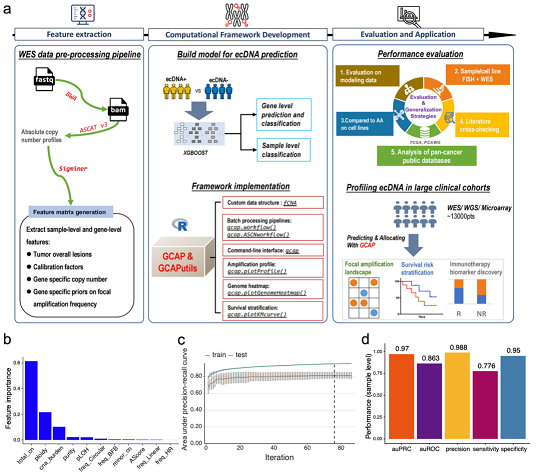On February 19, 2024, the team led by Prof. Rui-Hua Xu, Prof. Feng Wang, and Prof. Qi Zhao at Sun Yat-sen University Cancer Center achieved a groundbreaking milestone in cancer research. Their study, entitled "Machine learning-based extrachromosomal DNA identification in large-scale cohorts reveals clinical implications in cancer", was recently published in the esteemed journal Nature Communications (https://doi.org/10.1038/s41467-024-45479-6). The team introduced a cutting-edge machine learning model and tool, named GCAP, designed to accurately predict extrachromosomal DNA (ecDNA) amplification and its associated genes within tumor genomes. This novel approach integrates various genomic alterations, genomic lesions, copy number variations, and other factors at both the sample and gene levels. Noteworthy is its reliability in predicting ecDNA amplification in individual samples, as well as its adaptability to tumor whole-genome and SNP array data, underscoring its comprehensive practical utility. This research marks a significant leap forward in unraveling the role of ecDNA in cancer biology and underscores the potential clinical implications of this discovery.

Extrachromosomal DNA (ecDNA) is a circular DNA molecule found outside the cell's chromosomes, typically averaging 1Mb in size and frequently observed in various cancer cells. Research indicates that ecDNA serves as a predominant source of oncogene expression in tumor cells, with the transcriptional activity of oncogenes on ecDNA surpassing that of the same genes on chromosomes.
A comprehensive analysis of over 3200 clinical tumor samples using whole-genome sequencing data revealed that at least 14% of human tumors harbor ecDNA, with the prevalence of ecDNA-positive patients exceeding 20% in gastric and esophageal cancers. However, the clinical significance of ecDNA, particularly in the context of tumor immunotherapy, has not been extensively reported, largely due to the predominant use of whole exome sequencing technology in global immunotherapy clinical genomic testing, which could not be used to detect ecDNA. Thus, the development of bioinformatics algorithms tailored for ecDNA identification from whole exome sequencing data is imperative.
GCAP: Machine Learning-Based Framework for Detecting Extrachromosomal DNA Amplification in Tumors.
The research team developed the GCAP algorithm using machine learning methods, based on WES sequencing data from known ecDNA-positive and negative tumor patients, to accurately identify ecDNA presence and associated genes. Validation studies utilizing WGS, Circle-Seq, and FISH in cell lines, PDX models, and tissue samples confirmed the algorithm's precision.
Utilizing GCAP, the team conducted a comprehensive pan-cancer analysis of ecDNA amplification, investigating its correlation with clinical and molecular characteristics across various tumor cohorts, including TCGA, PCAWG, the Chinese colorectal cancer cohort, and gastrointestinal immunotherapy cohorts (comprising over 13,000 cancer patients). The analysis unveiled a mutually exclusive relationship between ecDNA amplification and microsatellite instability (MSI) at a pan-cancer level.
Extrachromosomal DNA Amplification is an Independent Risk Factor for Chinese Colorectal Cancer Cohort and Can be Used for Genome Molecular Subtyping and Optimization.
Furthermore, leveraging the genomic data of a thousand Chinese colorectal cancer cases from the preliminary screening by Sun Yat-sen University Cancer Center, this study integrated and analyzed ecDNA amplification with diverse common clinical and molecular features, identifying ecDNA amplification as an independent risk factor for colorectal cancer and refining the existing classification system.
Extrachromosomal DNA Amplification Predicts Poor Prognosis of Immunotherapy in GI Tumors.
Noteworthy is the analysis of clinical and genomic data from four anti-PD-1 immunotherapy trials in gastrointestinal tumors, which established the role of ecDNA amplification as a biomarker in gastrointestinal tumor immunotherapy, linking ecDNA amplification to the efficacy of immunotherapy interventions.
In conclusion, this study validates the concept of identifying ecDNA amplification from cancer whole-exome sequencing data, emphasizing ecDNA amplification as a crucial biomarker with significant implications for advancing personalized cancer treatment.
Professor Qi Zhao, Professor Feng Wang, and Professor Rui-Hua Xu from Sun Yat-sen University Cancer Center serve as corresponding authors, with Postdoctoral Fellow Shixiang Wang, Ph.D. candidate Chen-Yi Wu, Professor Ming-Ming He, and Master degree candidate Jia-Xin Yong as co-first authors of the study.



